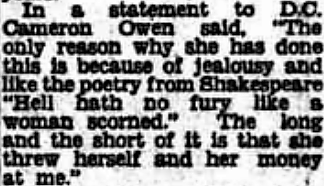The phrase hell hath no fury like a woman scorned is a misquotation from The mourning bride, a tragedy by the English playwright and poet William Congreve (1670-1729), produced and published in 1697:
Vile and ingrate! too late thou shalt repent
The base Injustice thou hast done my Love.
Yes, thou shalt know, spite of thy past Distress,
And all those Ills, which thou so long hast mourn’d;
Heav’n has no Rage, like Love to Hatred turn’d,
Nor Hell a Fury, like a Woman scorn’d.
But the image had appeared in Loves last shift, or, The fool in fashion (1696), a comedy by the English actor, writer and theatre manager Colley Cibber (1671-1757):
He’s pleased, and smiles to see me Rage the more! But he shall find no Fiend in Hell can match the fury of a disappointed Woman!—Scorned! slighted! dismissed without a parting Pang! Oh torturing thought! May all the Racks Mankind e’er gave our easie Sex, Neglected Love, Decaying Beauty, and hot Raging Lust light on me, if e’re I cease to be the Eternal Plague of his remaining Life, nay, after Death.
The earliest instance of the current phrase that I have found is from Terræ-Filius¹: Or, The secret history of the University of Oxford (1726), by the English satirist and political writer Nicholas Amhurst (1697-1742):
Wednesday, May 8 [1721].
Terræ-Filius’s Advice, &c. continued.
My Lads,
[…]
Have a particular regard how you speak of those gaudy things, which flutter about Oxford in prodigious numbers, in summer time, call’d Toasts²; take care how you reflect on their parentage, their condition, their Virtue, or their beauty; ever remembring that of the Poet,
Hell has no Fury like a Woman scorn’d,
Especially when they have spiritual bravoes on their side, and old lecherous bully-backs³ to revenge their cause on every audacious contemner⁴ of Venus and her altars.
¹ The Latin terræ filius, literally a son of the earth, was used to denote a person of obscure parentage. At the University of Oxford, the term designated an orator privileged to make humorous and satirical strictures in a speech at the public Act, that is, the ceremony to mark the completion of degrees, during which theses were publicly defended. The Act took place in early July, and the ceremony typically included sermons, music and increasingly satirical speeches; the last Act was held in 1733.
² Here, toast denotes a lady who is named as the person to whom a company is requested to drink, and who often becomes the reigning belle of the season—cf. the toast of the town. For example, in The Careless Husband (1705), a comedy by Colley Cibber, Sir Charles Easy says to Lady Betty Modish:
(1714 edition)
Ay, Madam, your Reputation—[…]’t has been your Life’s whole Pride of late to be the common Toast of every publick Table, vain ev’n in the infamous Addresses of a marry’d Man.
³ The term bully-back means a bully who supports another person; here, bully probably denotes a swashbuckling gallant—cf. the origin of ‘bully’?.
⁴ contemner: a despiser, scorner
The phrase has sometimes been misattributed to the English playwright and poet William Shakespeare (1564-1616), as in Hell hath no fury like a woman—Quoted Shakespeare, got benefit of doubt, published in the Lancaster Guardian and Lancaster Observer of 2nd April 1953:
In a statement to D. C. Cameron Owen said, “The only reason why she has done this is because of jealousy and like the poetry from Shakespeare “Hell hath no fury like a woman scorned.” The long and the short of it is that she threw herself and her money at me.”

Cf. also the punning phrase hell hath no fury like a woman’s corns.
